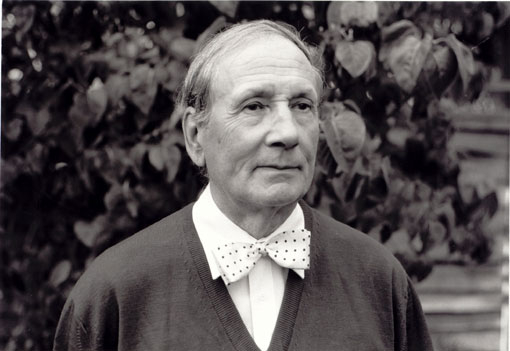

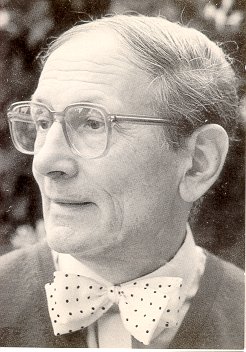 GB: That’s a good question. The answer is
to make them listen to it. The hardest thing, I think, for uninstructed
people, is to listen continuously, particularly in our twentieth century
situation when one is surrounded by noises one doesn’t want to hear; you
switch your ears off almost automatically. The task of a teacher in
the sort of class we’re talking about is to make them open their ears, and
also see that music progresses in time from one bar to the next, that they
hear one bar after another, just as they read one sentence after the other
in a book.
GB: That’s a good question. The answer is
to make them listen to it. The hardest thing, I think, for uninstructed
people, is to listen continuously, particularly in our twentieth century
situation when one is surrounded by noises one doesn’t want to hear; you
switch your ears off almost automatically. The task of a teacher in
the sort of class we’re talking about is to make them open their ears, and
also see that music progresses in time from one bar to the next, that they
hear one bar after another, just as they read one sentence after the other
in a book.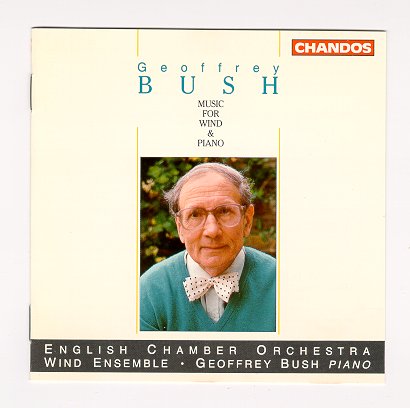 BD: Did you go back then and alter your tempo markings
in the score?
BD: Did you go back then and alter your tempo markings
in the score?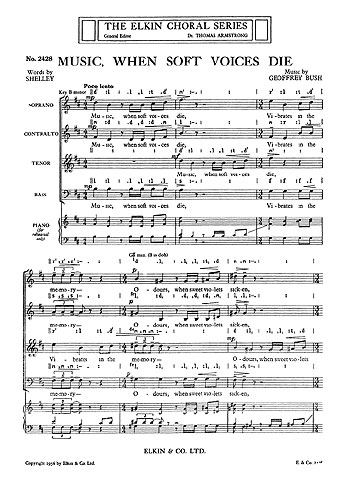 BD: When you’re working on the piece and you’re getting
it ready, and you’ve got all of the notes down and you’re tidying up and
making the corrections, how do you know when to put the pencil down and say,
“It is finished and ready to be launched”?
BD: When you’re working on the piece and you’re getting
it ready, and you’ve got all of the notes down and you’re tidying up and
making the corrections, how do you know when to put the pencil down and say,
“It is finished and ready to be launched”?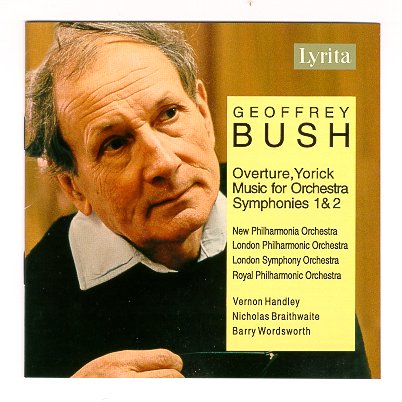 GB: I don’t think I had any expectations, particularly,
one way or the other. I think when one’s young, one has great ambitions
for oneself, but these soon take on a much more realistic air. I think
I’m very fortunate to be where I am now!
GB: I don’t think I had any expectations, particularly,
one way or the other. I think when one’s young, one has great ambitions
for oneself, but these soon take on a much more realistic air. I think
I’m very fortunate to be where I am now!
Geoffrey Bush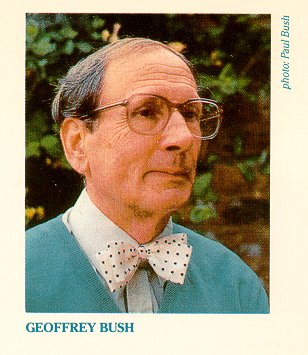 Born in 1920, Geoffrey Bush was a chorister at Salisbury Cathedral, and later
educated at Lancing College and Balliol College, Oxford. He joined the staff
of the Extra-mural Department of Oxford University in 1947, moving to London
University in 1952. Elected Chairman for the year of the Composers Guild
of Great Britain, in 1964 Geoffrey Bush visited the USSR as delegate of the
Guild. From 1952-1987 Geoffrey Bush was the Staff Tutor in Music at the Extra-Mural
Department of London University. An ardent champion of English music, he
wrote widely on the subject, also contributing regularly to BBC Radio 3 programmes,
including Music Magazine and Music Weekly.
Born in 1920, Geoffrey Bush was a chorister at Salisbury Cathedral, and later
educated at Lancing College and Balliol College, Oxford. He joined the staff
of the Extra-mural Department of Oxford University in 1947, moving to London
University in 1952. Elected Chairman for the year of the Composers Guild
of Great Britain, in 1964 Geoffrey Bush visited the USSR as delegate of the
Guild. From 1952-1987 Geoffrey Bush was the Staff Tutor in Music at the Extra-Mural
Department of London University. An ardent champion of English music, he
wrote widely on the subject, also contributing regularly to BBC Radio 3 programmes,
including Music Magazine and Music Weekly.Geoffrey Bush's catalogue of works is far-ranging in scope and content, including 2 symphonies, many smaller scale orchestral pieces, and music for chamber ensemble. Bush's music is as varied as his tastes and interests. His Symphony 1 (1954) was first performed at the Cheltenham Festival in July 1954 by the City of Birmingham Symphony orchestra, conducted by Rudolf Schwarz. This symphony, as with the structures used in much of his work, has its roots in neo-classicism. It was performed at the Proms in 1958 by the BBC Symphony Orchestra, conducted by Maurice Miles. Symphony 2 ("The Guildford") was commissioned for the 700th anniversary of the City of Guildford in 1957. Among the most popular titles from Geoffrey Bush's catalogue are the Concerto for Light Orchestra (1958), and his two choral works A Christmas Cantata (1947), and In Praise of Mary (1955). His music for theatre is often witty, as shown in the scintillating one-act opera Lord Arthur Savile's Crime (1972). Perhaps Geoffrey Bush's most characteristic music is for voices: stage-works, choral pieces and solo songs. With a natural affinity for a wide range of texts (from Chaucer to Stevie Smith via Jonson, Wilde and Virginia Woolf) - his music always serves to embellish and illuminate the given word. |
This interview was recorded on the telephone on October 21, 1991.
Portions (along with recordings) were used on WNIB in 1995 and 2000.
This transcription was made and posted on this website in 2009.
To see a full list (with links) of interviews which have been transcribed and posted on this website, click here.
Award - winning broadcaster Bruce Duffie was with WNIB, Classical 97 in Chicago from 1975 until its final moment as a classical station in February of 2001. His interviews have also appeared in various magazines and journals since 1980, and he now continues his broadcast series on WNUR-FM, as well as on Contemporary Classical Internet Radio.
You are invited to visit his website for more information about his work, including selected transcripts of other interviews, plus a full list of his guests. He would also like to call your attention to the photos and information about his grandfather, who was a pioneer in the automotive field more than a century ago. You may also send him E-Mail with comments, questions and suggestions.